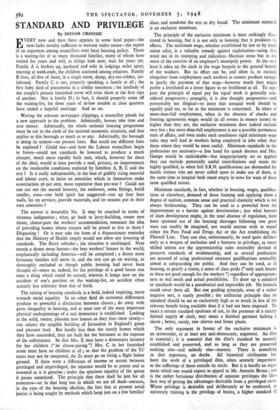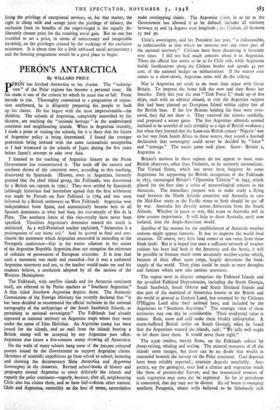STANDARD AND PRIVILEGE
By HONOR CROOME
EVERY now and then there appears in some local paper—the item lacks novelty sufficient to warrant wider notice—the report of an argument among councillors over local housing policy. There is a waiting-list of so many thousand families, many of whom have waited for years and will, as things look now, wait for years yet. Family A is broken up, husband and wife in lodgings miles apart, meeting at week-ends, the children scattered among relatives. Family B lives, all five of them, in a single room, damp, dry-rot-ridden, rat- infested. Family C is not, properly speaking, a family at all ; the first baby died of pneumonia in a similar tenement ; the landlady of the couple's present furnished room will evict them at the first sign of another. Nor is family D ; in fact, it should properly come off the waiting-list, for three years of in-law trouble at close quarters have ended a hopeful marriage. And so on.
Waving the relevant newspaper clippings, a councillor pleads for a new approach to the problem. Admittedly, houses take time and cost money. Admittedly, the whole national housing programme must be cut to the cloth of the national economic situation, and that applies to this borough as much as to any. Admittedly, the borough is doing its utmost—on present lines. But could not different lines be explored ? Could not—and here the Labour councillors begin to frown—could not standards be lowered to produce a much cheaper, much more rapidly built unit, which, however far short of the ideal, would at least provide a roof, privacy, an improvement on the intolerable conditions endured by familites A, B, C and the rest ? Is it really indispensable, in the face of giddily rising material and labour costs, to insist on amenities which in themselves make construction 26 per cent. more expensive than pre-war ? Could not one cut out the second lavatory, the outhouse, some fittings, build smaller, even—one bold spirit has suggested—run up four bare walls, lay on services, provide materials, and let tenants put in their own amenities ?
The answer is invariably No. It may be couched in terms of virtuous indignation ; what, go back to jerry-building, create new slums, cheese-pare the workers' accommodation, renounce the idea of providing homes whose tenants will be proud to live in them ? Disgusting ! Or it may take the form of a dispassionate reminder that the Ministry of Health simply would not allow any lowering of standards. The flurry subsides ; the situation is unchanged. Next month a dozen more houses—the best workers' houses in the world, emphatically including America—will be completed ; a dozen more fortunate families will move in, and the rest can go on waiting, as thoroughly excluded as though public housing had never been thought of—more so, indeed, for the privilege of a good house was once a thing which could be earned, whereas it hangs now on the accident of one's position on the waiting-list, an accident often scarcely less arbitrary than that of birth.
The raising of housing standards is -a bold, indeed inspiring, move towards social equality. In no other field do economic differences produce so powerful a distinction between classes ; do away with gross inequality in housing, and at once one of the most important physical underpinnings of a real democracy is established. Looking at the solid, roomy, pleasant new houses as they rise—how slowly— one salutes the tangible building of Jerusalem in England's green and pleasant land. But hardly less than the stately homes which they have succeeded, they are built for the fortunate at the expense of the unfortunate. So that Mrs. X may have a downstairs lavatory for her children ("no cheese-paring") Mrs. C in her furnished room must have no children at all ; so that the gradient of the Ys' stairs may not be steepened, the Zs must go on living a flight below ground. If there were a difference of income or accent between privileged and unprivileged, the injustice would be as patent and as resented as it is genuine ; under the spurious equality of the queue it passes unnoticed. The principle that there shall be jam for all tomorrow—or in that long run in which we are all dead—excuses, in the eyes of the housing idealists, the fact that at present social justice is being sought by methods which heap jam on a few families' slices and condemn the rest to dry bread. The minimum standard is an exclusive minimum.
The principle of the exclusive minimum is most strikingly illus- trated in housing, but it is not only in housing that it produces its effects. The minimum wage, whether established by law or by trade union edict, is a valuable remedy against exploitation—using that word not in its sweeping and ridiculous Marxian sense but in the sense of the exercise of an employer's monopoly power. At the very least it takes up the slack in the wage bargain to the general benefit of the workers. But its effect can be, and often is, to exclude altogether from employment such workers as cannot produce enough to justify the payment of that wage—however much they might prefer a livelihood at a lower figure to no livelihood at all. To sup- port the principle of equal pay for equal work is generally con- sidered progressive ; strangely, it is also thought progressive—and presumably not illogical—to insist that unequal work should be equally paid too, so far as the minimum is concerned. In times of more-than-full employment, when in the absence of checks and freezing agreements wages would (at all events in money terms) be higher than they are, the exclusive minimum does indeed exclude very few ; but more-than-full employment is not a possible permanent state of affairs, and even under such conditions rigid minimum wage rules may well lead to workers being employed in jobs other than those where they would be most useful. Minimum standards in the professions are necessary—a free hand for quack doctors and Mrs. Gamps would be unthinkable—but inappropriately set or applied they can exclude potentially useful contributions and waste the highly qualified,*as when full S.R.N. qualifications are demanded for health visitors who are never called upon to make use of them, at the same time as hospital beds stand empty in rows for want of these same qualified nurses.
Minimum standards, in fact, whether in housing, wages, qualifica- tions or elsewhere, demand of those framing and applying them a degree of realism, common sense and practical elasticity which is not always forthcoming. They can be used as a powerful lever for improvement or a barrier against deterioration ; just what horrors of slum development might, in the total absence of regulation, have been spawned out of the housing shortages following two great wars can readily bt imagined, nor would anyone wish to repeal either the Pure Food and Drugs Act or the Act establishing the Plimsoll Line. They can also, unfortunately, be used quite deliber- ately as a weapon of exclusion and a buttress to privilege, as many skilled unions use the apprenticeship rules ostensibly devised to preserve standards of workmanship, and as several professions are accused of using professional entrance qualifications ostensibly aimed at safeguarding the public. And they can be used, as in housing, to gratify a vision, a sense of class pride ("only such houses as these are good enough for the workers ") regardless of appropriate- ness to real needs and actual possibilities. To draw up a standard or standards would be a paradoxical and impossible job. No formula could cover them all. But one guiding principle, even of a rather negative sort, is surely possible ; the utilitarian principle• that no standard should be set so exclusively high as to result in less of the relevant benefit being available than if it had not been imposed. To exact a certain standard opulence of cut, in the presence of a strictly limited supply of cloth, may mean a finished garment lacking a sleeve ; better, surely, two sleeves and fewer pleats.
The only argument in favour- of the exclusive minimum is an aristocratic, or at least any anti-democratic, argument. An elite is essential ; it is essential that the elite's standard be securely established and preserved, and so long as they are preserved nothing else—and nobody else—matters. There is something in that argument, no doubt. All historical civilisation has been the work of a privileged elite, often serenely impervious to the sufferings of those outside its circle. But it is hardly an argu- ment which one would expect to appeal to Mr. Aneurin Bevan ; nor is the rather fortuitous distribution of separate privileges the like- liest way of getting the advantages derivable from a privileged caste. Where privilege is desirable and deliberately to be conferred, as university training is the privilege of brains, a higher standard of living the privilege of exceptional services, or, for that matter, the right to cheap milk and orange juice the privilege of infancy, the exclusion from its benefits of the unprivileged is the equally de- liberately chosen price for the resulting social gain. But no one has troubled to set a price, in terms of unnecessary and inequitable hardship, on the privileges created by the workings of the exclusive minimum. It is about time for a little unbiased social accountancy ; and the housing programme would be a good place to begin.











































 Previous page
Previous page